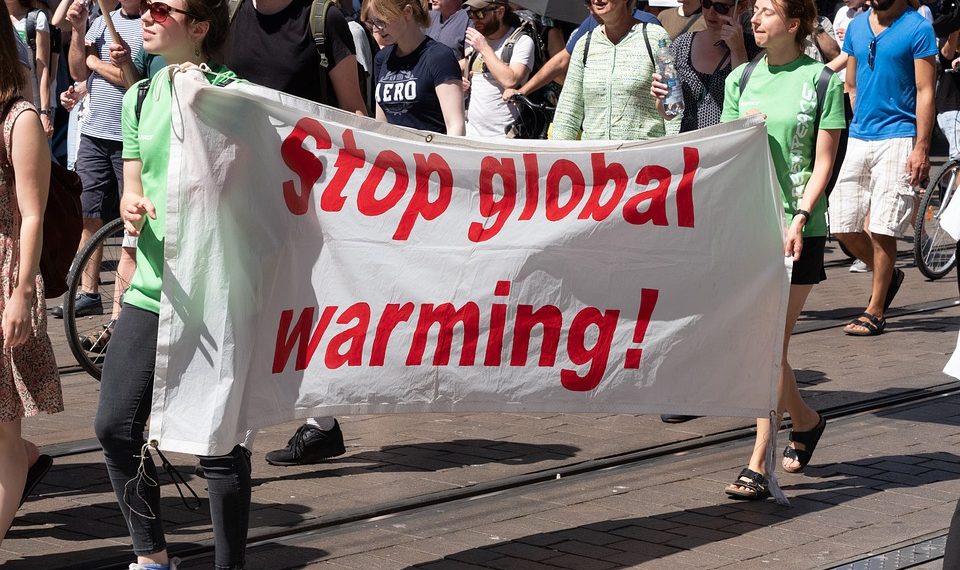-
U.N. says world on course to warm 2.7C on today's emissions pledges

The BBC reported according to the UN Environment Programme, national plans to cut carbon fall far short of what's needed to avert dangerous climate change.
The Emissions Gap report says country pledges will fail to keep the global temperature under 1.5C this century.
The BBC said, the Unep analysis suggests the world is on course to warm around 2.7C with hugely destructive impacts.
But there is hope that, if long term net-zero goals are met, temperatures can be significantly reined in.
According to the UN Secretary General, Antonio Guterres, just a few days before COP26 opens in Glasgow and another scientific report on climate change is "another thundering wake-up call".
This week, we've already had a study from the WMO showing that warming gases were at a new high last year, despite the pandemic.

Now in its 12th year, this Emissions Gap report looks at the nationally-determined contributions (NDCs) or carbon-cutting plans that countries have submitted to the UN ahead of COP.
Read more: White House rejects proposal to donate expiring unused COVID-19 vaccines overseas
These pledges run up to 2030 and have been submitted by 120 countries. Unep has also taken account of other commitments to cut warming gases not yet formally submitted in an NDC.
The report finds that when added together, the plans cut greenhouse gas emissions in 2030 by around 7.5% compared to the previous pledges made five years ago.
This is nowhere near enough to keep the 1.5C temperature threshold within sight, say the scientists who compiled the study.
To keep 1.5C alive would require 55% cuts by the same 2030 date. That means the current plans would need to have seven times the level of ambition to remain under that limit.

"To stand a chance of limiting global warming to 1.5C, we have eight years to almost halve greenhouse gas emissions: eight years to make the plans, put in place the policies, implement them and ultimately deliver the cuts," said Inger Andersen, executive director of Unep.
"The clock is ticking loudly."
According to the authors, the current pledges would see the world warm by 2.7C this century, a scenario that Antonio Guterres calls a "climate catastrophe".
Read more: The stalemate of Vienna nuclear talks
He believes the report highlights the failures of political leaders.
"The emissions gap is the result of a leadership gap," he said at the launch of the study.
"But leaders can still make this a turning point to a greener future instead of a tipping point to climate catastrophe."
As Mr Guterres suggests, there are some hopeful signs in the report.
Around 50 countries plus the EU have pledged a net zero target for the middle of this century.
These strategies cover over half of greenhouse gas emissions.
The Unep analysis finds that if these plans were implemented fully, this could shave 0.5C off the temperature rise by 2100.
This would bring the global temperature level down to 2.2C, which would see dramatic and deadly impacts from warming but would be a step in the right direction from where the world is currently headed.
The problem, though, is that many of these net zero goals are ambiguous, say the authors - particularly among the world's 20 richest nations, where a dozen long-term plans are said to be quite vague.

Many delay significant cuts until after 2030, raising serious doubts about whether they can really deliver net zero just 20 years later.
Another hopeful sign relates to methane. The report also says there is great potential to make progress on these emissions, which are the second largest source of warming.
Up to 20% of these emissions from fossil fuels, from waste and from agriculture could be curbed at low or no cost.
However, the opportunity to develop a far greener world as the world recovers from Covid is in danger of being lost, say the authors.
They find that around 20% of recovery investments will support renewables and the green economy.
"The huge sums spent to recover economies from Covid-19 are a once-in-a-generation opportunity to boost low-carbon technologies and industries. In most cases, this opportunity is not being taken," said Brian O'Callaghan, project manager of the Oxford University Economic Recovery Project, and an author on the Unep report.
"This is a particular slap in the face for vulnerable nations who are suffering the worst consequences of climate change…we remain without a commitment from the highest emitters to cover the loss and damage that they have brought on the world."
Source: BBC
You May Also Like
Popular Posts
Caricature
BENEFIT Sponsors BuildHer...
- April 23, 2025
BENEFIT, the Kingdom’s innovator and leading company in Fintech and electronic financial transactions service, has sponsored the BuildHer CityHack 2025 Hackathon, a two-day event spearheaded by the College of Engineering and Technology at the Royal University for Women (RUW).
Aimed at secondary school students, the event brought together a distinguished group of academic professionals and technology experts to mentor and inspire young participants.
More than 100 high school students from across the Kingdom of Bahrain took part in the hackathon, which featured an intensive programme of training workshops and hands-on sessions. These activities were tailored to enhance participants’ critical thinking, collaborative problem-solving, and team-building capabilities, while also encouraging the development of practical and sustainable solutions to contemporary challenges using modern technological tools.
BENEFIT’s Chief Executive Mr. Abdulwahed AlJanahi, commented: “Our support for this educational hackathon reflects our long-term strategic vision to nurture the talents of emerging national youth and empower the next generation of accomplished female leaders in technology. By fostering creativity and innovation, we aim to contribute meaningfully to Bahrain’s comprehensive development goals and align with the aspirations outlined in the Kingdom’s Vision 2030—an ambition in which BENEFIT plays a central role.”
Professor Riyadh Yousif Hamzah, President of the Royal University for Women, commented: “This initiative reflects our commitment to advancing women in STEM fields. We're cultivating a generation of creative, solution-driven female leaders who will drive national development. Our partnership with BENEFIT exemplifies the powerful synergy between academia and private sector in supporting educational innovation.”
Hanan Abdulla Hasan, Senior Manager, PR & Communication at BENEFIT, said: “We are honoured to collaborate with RUW in supporting this remarkable technology-focused event. It highlights our commitment to social responsibility, and our ongoing efforts to enhance the digital and innovation capabilities of young Bahraini women and foster their ability to harness technological tools in the service of a smarter, more sustainable future.”
For his part, Dr. Humam ElAgha, Acting Dean of the College of Engineering and Technology at the University, said: “BuildHer CityHack 2025 embodies our hands-on approach to education. By tackling real-world problems through creative thinking and sustainable solutions, we're preparing women to thrive in the knowledge economy – a cornerstone of the University's vision.”
opinion
Report
ads
Newsletter
Subscribe to our mailing list to get the new updates!






















